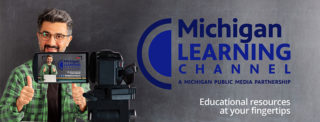At a time when we’re all learning in uniquely new ways outside of a traditional classroom, Michigan’s Public Television Stations have teamed up with Michigan educators to build a new statewide learning service which will provide instructional content to support the work of teachers and parents alike through universally available platforms.
It’s a major day in the history of Public Television in Michigan. Organized by Detroit Public Television (DPTV), the new learning network will deliver instructional content programming to students, parents and teachers, using a wide variety of media platforms, including a system of dedicated broadcast channels.

The Michigan Learning Channel is scheduled to begin operation in early January of 2021, providing curriculum-aligned instructional resources for students and teachers, beginning with Pre-K to 3rd grade content and quickly expanding to include grades 4 to 12.
When fully developed, the Michigan Learning Channel will include a statewide network of new broadcast channels, dedicated to bringing this content into homes throughout Michigan, overcoming limitations in online access for rural and urban areas alike. In addition to Detroit Public Television, the network will include WKAR Public Media from Michigan State University, Delta College Public Media, WGVU Public Media from Grand Valley State University, WCMU Public Media from Central Michigan University and WNMU-TV from Northern Michigan University.
DPTV will pilot the service on its WORLD Channel (56.4 in Southeast Michigan) from 8 am to noon weekdays beginning on Monday, November 2nd. The four hours of Pre-K to 3rd grade content will also be streamed through the Michigan Learning Channel website at http://MichiganLearning.org. The WORLD Channel is currently offering programming for grades 6-12 from noon to 5 pm.
The Michigan Learning Channel concept has been endorsed by the Michigan Department of Education, the Michigan Association of Intermediate School Administrators (MAISA), the Michigan Association of Superintendents and Administrators (MASA) and the Business Leaders for Michigan.
Rich Homberg, President and CEO of DPTV, tells us, “From day one, we have worked with leading people in the field of education and with a diverse cross-section of parents and concerned citizens to develop a plan that meets the evolving needs of families and teachers,” and adds, “Public television has a long history of developing age-appropriate educational content in partnership with those closest to the communities we serve.”
Homber goes on to say, “The Michigan Learning Channel takes this one step further. We will use our various platforms – over the air, online and through social media – to increase access to educational programming and resources, at home, schools, daycare centers or wherever students may be. There will be a crucial need for this service during the pandemic and into the future.”
The Michigan Learning Channel was developed with the cooperation and support of leading educators and educational organizations in the state.
State Superintendent of Public Instruction Dr. Michael Rice says, “I wholeheartedly support and endorse the Michigan Learning Channel,” adding, “The ability for educational programming to reach nearly every household with a television and fill internet connectivity gaps is outstanding. I commend the public television stations of Michigan for adjusting to the unexpected changes brought on by the pandemic and moving quickly to provide enrichment opportunities to the children of Michigan. I look forward to serving our children in partnership with you.”
Every public television station in Michigan is participating in the Michigan Learning Channel and will establish a dedicated broadcast channel for the service. In Southeast Michigan, for instance, Detroit Public TV will carry this programming over the air on a new Channel 56.5. But it will also be available as a livestream as well as posted for on-demand viewing on a variety of digital and social media platforms, ensuring accessibility to all students, educators and families in the state.
The instructional content will be aligned with Michigan’s educational standards and will follow widely accepted sequences for mastering skills throughout the school year, to make it as useful as possible for schools and students. Designed to support and enrich school learning, the lessons will be presented by a diverse group of educators, delivered as if the teacher is in a classroom setting.
The broadcast channel will deliver lessons in scheduled 30- and 60-minute blocks for each grade level throughout the day, which will be repeated during the evenings and weekends. All content is offered at no cost to schools, families and caregivers. As new content is developed, it will be added to the Michigan Learning Channel platforms.
Here are some examples of the kind of instruction-based programming that the network will offer:
- Reading and English Language Arts: Lively lessons keep students’ reading skills moving forward and offer engaging writing activities
- Math: A full suite of elementary math lessons using the Eureka Math curriculum
- Science: The world of STEM from shows like “Joe’s Super Science Show”
- Social Studies: Standards-aligned lessons from geography to civics to U.S. history
Georgeann Herbert, DPTV’s Senior Vice President of Strategy, says, “At its core, our goal is to provide support to parents to ensure their children are able to realize their potential and master skills important to their future success in school and in life,” adding, “We are creating the infrastructure to provide a dynamic, rapidly adaptable support network to address the changing needs and priorities of our children’s education, now and into the future.”
Herbert goes on to say, “This content does not replace teachers but gives families and educators more options to support student success during the current crisis and beyond. In this way, we can help engage parents more deeply in their children’s learning and encourage them to form strong partnerships with teachers and their local schools.”
In addition to primary and secondary education, the Michigan Learning Channel plans to eventually add adult educational content, developed in collaboration with unions, community colleges and universities. These programs would support the completion of college and career certification programs to help fill high-need positions in the workforce.
The Michigan Learning Channel will provide programming that is separate and distinct from PBS’s highly successful 24/7 Kids Channel, which specializes in educating young children with animated content and familiar characters. The MLC will complement the PBS KIDS Channel, its existing online content and PBS KIDS apps to give children and families a rich trove of educational resources.
DPTV’s Homberg says, “The Michigan Learning Channel will provide the educators, teachers and all the other caregivers who surround children with immediate support as our educational system evolves to navigate the pandemic, but it is also a work in progress. We will continue to enrich and refine the content with the feedback and input we receive from parents and educators.”
Homberg adds, “There is nothing more important for the well-being of Michigan than the education of our youth. The Michigan Learning Channel is one step in ensuring that all children in the state receive the education and, ultimately, the future they deserve.”
The Michigan Learning Channel has emerged quickly as a result of the disruption of traditional classroom procedures caused by the pandemic. However, it is rooted in years of study and experience by DPTV and its many partners in the field of education. The health crisis merely demonstrated the need to apply communication technology to fill disparities and gaps that already existed.
A report by The Education Trust – Midwest on the digital divide revealed that 35-percent of Michigan public school students have limited or no access to the internet from home. In some districts, the lack of internet access rises to as high as 55-percent, disproportionately borne by children of color and children in rural areas. In contrast, broadcast television reaches nearly every home in Michigan.
Even homes with good internet access may lack sufficient devices and/or bandwidth to accommodate parents working from home and multiple children seeking online instruction. Such instruction delivered via television provides a nearly universal alternative.
Public television is uniquely positioned to bridge the digital divide. For the past 17 years, public television has been named the most trusted public institution in America, and DPTV has been nationally recognized for its work in early childhood education programs, both on air and in the community. Last year it was the recipient of the Michigan Governor’s Service Award as an Education Service Leader.
To deploy and operate the statewide education channel and related services, Detroit Public Television is partnering with Public Media Group, a national technology infrastructure company that designs and manages next generation broadcast platforms.
Initial funding for the Michigan Learning Channel is provided by awards totaling $3.5 million; 43- percent or $1.5 million of the budget is through a grant from the Michigan Department of Education supported by the Governors Education Emergency Relief (GEER) Fund Grant, part of the CARES Act. The remainder is through funding from the Michigan State Legislature. None of the financing is currently from non-governmental sources.
Public television stations in Michigan are engaged in regular conversations to finalize plans for the Michigan Leaning Channel, its services and how to best serve their local schools and educators.
Detroit Public TV (DPTV) is Michigan’s only community-licensed public television station and, during the COVID-19 crisis, has significantly adjusted its broadcast schedules and digital platforms to support parents and children engaged in learning at home. With more than 2 million weekly viewers across its four channels, DPTV is the state’s largest and most watched public television station, as well as having the most diverse public television audience in America.
DPTV is licensed to the Detroit Educational Television Foundation and governed by a volunteer board of trustees from the local business, civic and cultural communities. For more information, visit online at http://dptv.org.






